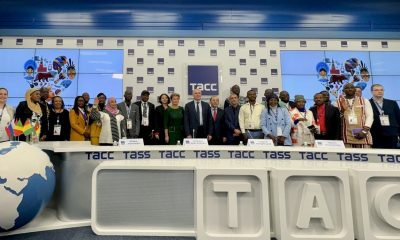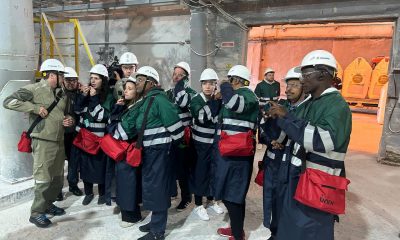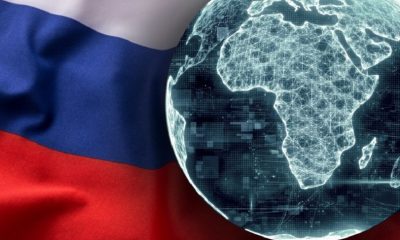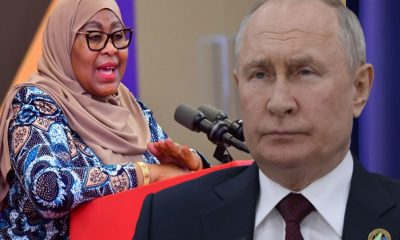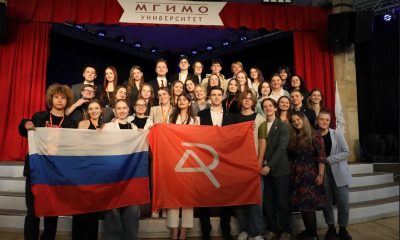World
Explainer: Russia’s Geopolitical Games With Africa
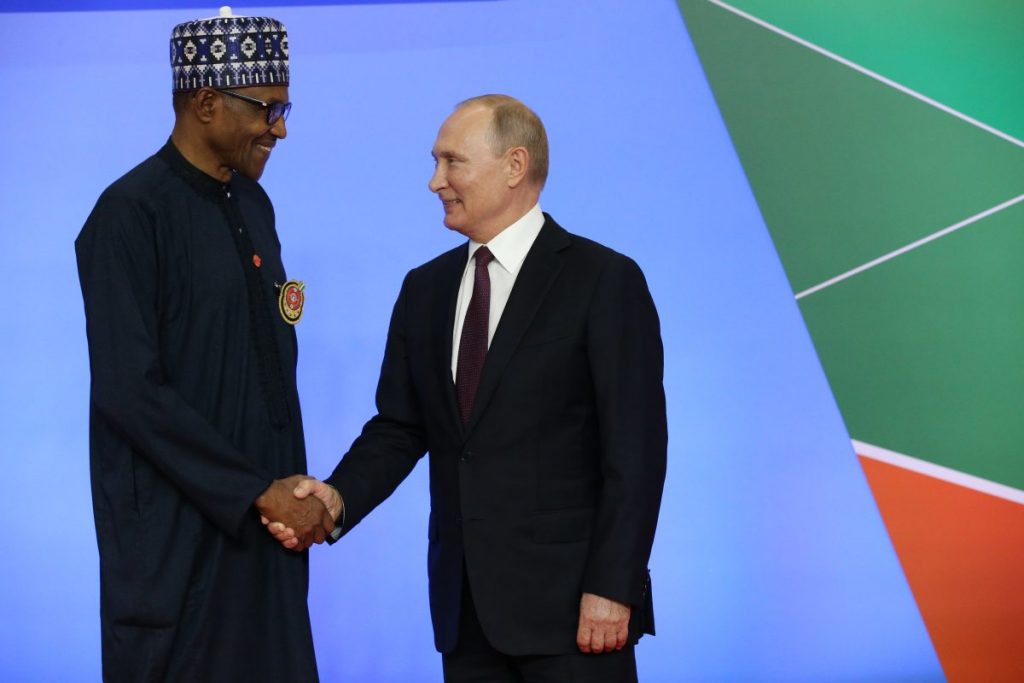
By Kestér Kenn Klomegâh
Russian Foreign Minister, Sergey Lavrov, expresses desperate fears and is highly nervous over possible clandestine threats by the United States and its European allies to derail the second Russia-Africa summit scheduled for late July 2023.
With the rapidly changing geo-political situation, mostly due to its ‘special military operation’ in the neighbouring Ukraine, which has adversely affected Africa’s economy and its 1.3 billion population, Russia plans to hold a summit to review and patch up the straddling relations.
After the first Russia-Africa summit held in October 2019, Russia has not delivered on several bilateral agreements that were signed with African countries. Moscow has not delivered on most of its pledges and promises that usually characterized talks with African leaders over these years.
According to summit reports, 92 bilateral agreements were pinned with a number of African countries. Russia is only passionate about signing tonnes of agreements. A classical case was during the critical period of coronavirus, Russia agreed to supply 300 million Sputnik vaccines through the African Union but was disappointed with delivery. It, however, sprinkled a few thousand to a couple of African countries to muscle-flex its soft power.
Besides that, Russia’s economic presence is hardly seen across Africa. There have been several development-oriented initiatives over these years but without tangible results. As expected, these weaknesses were compiled and incorporated in the ‘Situation Analytical Report’ by 25 policy researchers headed by Professor Sergey Karaganov, the Dean of the Faculty of World Economy and International Affairs at Moscow’s Higher School of Economics.
The report criticized Russia’s current policy and lukewarm approach towards implementing bilateral agreements in Africa. It pointed to the lack of coordination among various state and para-state institutions working with Africa.
According to the report, Russia plays very little role in Africa’s infrastructure, agriculture and industry. This 150-page report was presented in November 2021, which also offers new directions and recommendations for improving policy methods and approaches with Africa.
On the other side, anti-Western rhetoric and political confrontation have become the main content of foreign policy instead of focusing on its economic paradigms or directions within its capability to raise economic influence in the continent.
Lavrov’s early April interview with the local Russian news site, Argumenty i Fakty, and copy posted on the Foreign Ministry’s website vehemently reiterated fears that the United States is attempting to wreck the Russia-Africa summit.
“Indeed, the United States and its allies are doing all they can to isolate Russia internationally. For example, they are trying to torpedo the second Russia-Africa Summit scheduled to take place in St Petersburg in late July. They are trying to dissuade our African friends from taking part in it,” the top Russian diplomat said.
“However, there are fewer and fewer volunteers willing to sacrifice their vital interests for Washington and its henchmen and to pull the chestnuts out of the fire for the former colonial powers,” Lavrov noted. “Attempts to undermine our cooperation with the states of the global South and East will persist, although their success is far from guaranteed,” he added.
Lavrov, in the interview, said questions relating to the critical infrastructure development in Africa were on the agenda of the forthcoming summit. Russia views the summit as “a systemic element of Russia-Africa cooperation and will be filling it with meaningful content in close cooperation with African friends.”
“Its agenda includes such items as technology transfer and development of industry and critical infrastructure in Africa. We are going to discuss in detail Russia’s participation in projects on digitizing African states, developing their power engineering, agriculture and mineral extraction, and ensuring their food and energy security,” he further explained.
“I believe that the summit will strengthen Russia-Africa cooperation, provide a vector for the development of the entire range of relations with Africa in a mid-term perspective, and make a tangible contribution to the effective resolution of regional and international issues,” Lavrov added.
Further down the interview, Lavrov pointed to multifaceted and mutually advantageous cooperation between Russia and Africa. Russia would continue ensuring national security and sovereignty, continue building interstate cooperation on the principles of international law, equality, and mutual respect and consider both interests in Russia and Africa.
According to several expert policy reports, Russia sees growing neo-colonial tendencies as a threat to its participation in economic sectors in Africa. It consistently attributes Africa’s economic instability, development obstacles and pitfalls to the United States and its European allies. But the U.S. State Department, in a statement, did not address Lavrov’s accusations directly but said Washington was pursuing strong relationships with African countries “to address the shared challenges we face. Our Africa policy is about Africa.”
The statement quoted the US Secretary of State, Mr Antony Blinken, as saying the United States “(doesn’t) want to limit African partnerships with other countries. We want to give African countries choices.” Shunned by most Western countries since its invasion of Ukraine just over a year ago, Moscow has turned its efforts to countries in Asia and Africa. Lavrov has been particularly eager to nurture ties with Africa, visiting the continent twice this year as well as making a tour in mid-2022.
In terms of working with the African continent, experts usually say the African continent remains little known in Russia. And Russia’s presence is well-noted only for anti-Western rhetoric instead of concentrating on what it could concretely do in Africa.
It is struggling to regain influence and win sympathy, but Russia has to be serious with policy initiatives. It remains at the bottom level with its tourism, cultural and people-to-people interactions, often referred to as an essential part of public diplomacy. It claims to lead an emerging multipolar world order which requires basic openness, interaction and an integrative approach to aspects of social life.
At the same time, it expects and persuades Africans to simply sacrifice their Western and European cultural connections and even ‘family ties’ for the sake of friendship with Russia. It is a typical irrational step – extremely difficult to do. How do you ask Africans to cut such accumulated relations overnight? Historically, despite the negative effects of slavery, which everybody knows and also much criticized U.S. hegemony, but African-American diaspora is closely knitted by culture and by blood and now forms an undeniable core of the development processes of both societies.
Over the years, African leaders have been engaging with their diasporas, especially those excelling in sports, academia, business, science, technology, engineering and other significant fields that the continent needs to optimize its diverse potentials and to meet development priorities. These professionals primarily leverage various sectors and act as bridges between the United States and Africa. As explicitly acknowledged, the overarching efforts are to focus on deepening and expanding the long-term US-Africa partnership and advancing shared common priorities.
The Vice President of the Federal Republic of Nigeria, Professor Yemi Osinbajo, argues that the great resource that will enable Africa to cope with a rapidly changing world is its diaspora. He asked African leaders, public and private institutions, and businesses to take advantage of the diaspora outside the continent and relate with them for their education and professional skills for development inside Africa. He pointed to remittances from the African diaspora, which is substantial, rising from $37 billion in 2010 to $96 billion by 2021; the African diaspora is a source of strength for Africa.
As well-known, the world is going through a highly complex and somewhat confusing time. In addition to the United States, there are China, Russia, the European Union, the UK, India and Brazil as dominant regional powers. In comparison, China is Africa’s largest bilateral trading partner and will have about $254 billion in trade in 2021. That said, Africa has the United States and Europe, and a number of Asian countries as the traditional markets for exports earn a significant amount of revenue from those regions.
Does this situation mean the severing of all ties with the United States and Europe? What is Russia’s market for Africa? What is the level of Russia’s engagement, especially in the industrial sector, development of needed infrastructures and other relevant sectors for employment creation in the continent? How much revenue do African countries earn from Russia? Interestingly African leaders rather travel there with the ‘begging bowls’ and give ‘ear-deafening applause’ to offers of free grains, while their own agricultural practices are rudimentary and a vast expanse of their land remains uncultivated.
Professor Fyodor Lukyanov, Chairman of the Council on Foreign and Defense Policy, Research Director at the Valdai Discussion Club, and Editor-in-Chief of Russia in Global Affairs journal, told this author in an interview that Russia’s engagement depends largely on several factors. Notwithstanding all that, Africa has its strengths and weaknesses based on history, but the balance is positive in this emerging new world. Most of the potential success (especially transforming the economy and raising trade levels) depends on African countries themselves and their ability to build up relations with outside powers on a rational and calculated basis.
In comparison with other players, Russia largely plays words to win support or sympathy and most often rattles investment slogans with Africa. The United States, European Union members, China, India, Turkey and even the Gulf States discuss Africa from different perspectives, but more importantly, follow their desires and ways to establish their economic footprints on the continent.
Reports show that Russia has been strengthening its relations, meeting African ministers and delegations these several years. It has even opened trade missions with the responsibility of providing sustainable business services in a number of African countries. In addition, more than a decade since the establishment of the Coordinating Committee on Economic Cooperation with Sub-Saharan Africa. There are also several Joint Commissions on Trade and Economic Cooperation, and of course, there are 38 Russian diplomatic offices in Africa.
Across Africa, when officials and experts are discussing the situation in various sectors, they hardly mention infrastructures undertaken, completed and commissioned in the continent by Russians. A lot more important issues have received little attention since the first African leaders’ gathering. Russia has few achievements and few success stories to show at the next summit, according to another policy report by the South African Institute of International Affairs (SAIIA), a reputable policy think tank, published in 2022.
The report noted the dimensions of Russian power projection in Africa, new frontiers of Russian influence and a roadmap towards understanding how Russia is perceived in Africa. It highlighted narratives about anti-colonialism and described how these sources of solidarity are transmitted by Russian elites to the African public. For seeking long-term influence, Russian elites have oftentimes used elements of anti-colonialism as part of the current policy to control the perceptions of Africans and primarily as new tactics for power projection in Africa.
In the context of a multipolar geopolitical order, Russia’s image of cooperation could be seen as highly enticing, but it is also based on illusions. Better still, Russia’s posture is a clash between illusions and reality. “Russia, it appears, is a neo-colonial power dressed in anti-colonial clothes,” says the report.
Simply put, Moscow’s strategic incapability, inconsistency and dominating opaque relations are adversely affecting sustainable developments in Africa. Thus far, Russia looks more like a ‘virtual great power’ than a genuine challenger to European, American and Chinese influence.
The next report, titled – Russia’s Private Military Diplomacy in Africa: High Risk, Low Reward, Limited Impact – says that Russia’s renewed interest in Africa is driven by its quest for global power status. Few expect Russia’s security engagement to bring peace and development to countries with which it has security partnerships.
While Moscow’s opportunistic use of private military diplomacy has allowed it to gain a strategic foothold in partner countries successfully, the lack of transparency in interactions, the limited scope of impact and the high financial and diplomatic costs expose the limitations of the partnership in addressing the peace and development challenges of African host countries, the report says.
Furthermore, African countries where Russia intends to assist in ensuring a peaceful environment will require comprehensive peace and development strategies that include conflict resolution and peacebuilding, state-building, security sector reform, and profound political reforms to improve governance and the rule of law – not to mention sound economic planning critical for attracting foreign direct investment needed to spur economic growth.
Joseph Siegle, Director of Research and Daniel Eizenga, Research Fellow at the Africa Center for Strategic Studies, in a series of articles these few years, offered excellent comprehensive insights into possible reasons why military governments delay to fast-track or are hesitant in making a smooth return to constitutional government.
The two researchers reminded the African Union and ECOWAS to invoke the African Convention for the Elimination of Mercenarism, which went into effect in 1985, prohibiting states from allowing mercenaries into their territories. Borrowing from its Syria playbook, Moscow has followed a pattern of parachuting to prop up politically isolated leaders facing crises in regionally pivotal countries, often with abundant natural resources.
Many African experts explained that the interim military leaders in Africa are vacillating, turning down proposals to change over to constitutional rule. Their decision to remain in power absolutely violates the “Silence the Guns” policy adopted by the African Union. Holding media briefings after talks with his Malian counterpart, Lavrov has often reiterated that with the threats posed by frequent terrorist attacks, it is not the best time to hold democratic elections. It implies that Russia encourages military rule in Africa and that “one should not change horses in the middle of the stream,” according to official website sources.
Moreover, this is one area in which the great powers and emerging powers can put aside rivalries and work together with ECOWAS and the African Union on an initiative to stamp out terrorism in Africa, especially in the Sahel. Many simply forget the fact that an outstandingly good example uses regional integration arrangements to promote peace and security on the one hand and pursue economic development, trade and industry on the other.
During the 36th Ordinary Session of the African Union (AU) held in Addis Ababa, Prime Minister Abiy Ahmed, the Federal Democratic Republic of Ethiopia (FDRE), interestingly used the phrase – “African solutions to African problems” – seven times during his speech delivered on February 18. Besides that, he offered the suggestion that existing conflicts and disputes on the continent, it necessary to mobilize collective efforts to resolve them and “must be confined to this continent and quarantined from the contamination of non-African interference.”
Notwithstanding the current geopolitical games, African leaders have to utterly resist the landscape being used as playing fields; leaders who adopt excellent strategies could still benefit from all sides, especially not to join the political confrontation but rather remain neutral. The perspectives, decisions and actions of these global actors, including in multilateral forums, could impact on economic development across Africa.
In practical terms, what is needed today is systematic economic transformation, industrialization and upgrading employment-generating sectors; therefore, Africa can take full advantage of the global complexities and uncertainties. With external players, the focus has to be on practical economic diplomacy. The decisive factor in this context will then be knowledgeable leadership seriously committed to good governance and economic development.
Understandably, Russia has to clearly define its parameters despite the growth of external players’ influence and presence in Africa. While Russia appears to be consolidating relations, it is only full of symbolism; its policy model (distinctive opposite that of China and its passion for building infrastructures across Africa) is characterized by bilateral agreements without appreciably visible results. Yet, in these critical times, it strategically seeks enormous support, in any form, from Africa’s regional organizations and from the African Union.
Despite the current conditions of global changes, the irreversible fact is that Africa simply needs genuine external investors without frequent rhetorics and without geo-political slogans. Africa has already attained its political independence and sovereignty these sixty years in the process of economic transformation. With its 1.3 billion population, Africa is a potential market for all kinds of consumable goods and for services. In the coming years, there will obviously be an accelerated competition between or among the external players over access to resources and, of course, economic influence in Africa.
World
AfBD, AU Renew Call for Visa-Free Travel to Boost African Economic Growth

By Adedapo Adesanya
The African Development Bank (AfDB) and the African Union have renewed their push for visa-free travel to accelerate Africa’s economic transformation.
The call was reinforced at a High-Level Symposium on Advancing a Visa-Free Africa for Economic Prosperity, where African policymakers, business leaders, and development institutions examined the need for visa-free travel across the continent.
The consensus described the free movement of people as essential to unlocking Africa’s economic transformation under the African Continental Free Trade Area (AfCFTA).
The symposium was co-convened by AfDB and the African Union Commission on the margins of the 39th African Union Summit of Heads of State and Government in Addis Ababa.
The participants framed mobility as the missing link in Africa’s integration agenda, arguing that while tariffs are falling under AfCFTA, restrictive visa regimes continue to limit trade in services, investment flows, tourism, and labour mobility.
On his part, Mr Alex Mubiru, Director General for Eastern Africa at the African Development Bank Group, said that visa-free travel, interoperable digital systems, and integrated markets are practical enablers of enterprise, innovation, and regional value chains to translate policy ambitions into economic activity.
“The evidence is clear. The economics support openness. The human story demands it,” he told participants, urging countries to move from incremental reforms to “transformative change.”
Ms Amma A. Twum-Amoah, Commissioner for Health, Humanitarian Affairs and Social Development at the African Union Commission, called for faster implementation of existing continental frameworks.
She described visa openness as a strategic lever for deepening regional markets and enhancing collective responses to economic and humanitarian crises.
Former AU Commission Chairperson, Ms Nkosazana Dlamini-Zuma, reiterated that free movement is central to the African Union’s long-term development blueprint, Agenda 2063.
“If we accept that we are Africans, then we must be able to move freely across our continent,” she said, urging member states to operationalise initiatives such as the African Passport and the Free Movement of Persons Protocol.
Ghana’s Trade and Industry Minister, Mrs Elizabeth Ofosu-Adjare, shared her country’s experience as an early adopter of open visa policies for African travellers, citing increased business travel, tourism, and investor interest as early dividends of greater openness.
The symposium also reviewed findings from the latest Africa Visa Openness Index, which shows that more than half of intra-African travel still requires visas before departure – seen by participants as a significant drag on intra-continental commerce.
Mr Mesfin Bekele, Chief Executive Officer of Ethiopian Airlines, called for full implementation of the Single African Air Transport Market (SAATM), saying aviation connectivity and visa liberalisation must advance together to enable seamless travel.
Regional representatives, including Mr Elias Magosi, Executive Secretary of the Southern Africa Development Community, emphasised the importance of building trust through border management and digital information-sharing systems.
Ms Gabby Otchere Darko, Executive Chairman of the Africa Prosperity Network, urged governments to support the “Make Africa Borderless Now” campaign, while tourism campaigner Ras Mubarak called for more ratifications of the AU Free Movement of Persons protocol.
Participants concluded that achieving a visa-free Africa will require aligning migration policies, digital identity systems, and border infrastructure, alongside sustained political commitment.
World
Nigeria Exploring Economic Potential in South America, Particularly Brazil

By Kestér Kenn Klomegâh
In this interview, Uche Uzoigwe, Secretary-General of NIDOA-Brazil, discusses the economic potential in South America, particularly Brazil, and investment incentives for Brazilian corporate partners for the Federal Republic of Nigeria (FRN). Follow the discussion here:
How would you assess the economic potential in the South American region, particularly Brazil, for the Federal Republic of Nigeria? What investment incentives does Nigeria have for potential corporate partners from Brazil?
As the Secretary of NIDOA Brazil, my response to the questions regarding the economic potentials in South America, particularly Brazil, and investment incentives for Brazilian corporate partners would be as follows:
Brazil, as the largest economy in South America, presents significant opportunities for the Federal Republic of Nigeria. The country’s diverse economy is characterised by key sectors such as agriculture, mining, energy, and technology. Here are some factors to consider:
- Natural Resources: Brazil is rich in natural resources like iron ore, soybeans, and biofuels, which can be beneficial to Nigeria in terms of trade and resource exchange.
- Growing Agricultural Sector: With a well-established agricultural sector, Brazil offers potential collaboration in agri-tech and food security initiatives, which align with Nigeria’s goals for agricultural development.
- Market Size: Brazil boasts a large consumer market with a growing middle class. This represents opportunities for Nigerian businesses looking to export goods and services to new markets.
- Investment in Infrastructure: Brazil has made significant investments in infrastructure, which could create opportunities for Nigerian firms in construction, engineering, and technology sectors.
- Cultural and Economic Ties: There are historical and cultural ties between Nigeria and Brazil, especially considering the African diaspora in Brazil. This can facilitate easier business partnerships and collaborations.
In terms of investment incentives for potential corporate partners from Brazil, Nigeria offers several attractive incentives for Brazilian corporate partners, including:
- Tax Incentives: Various tax holidays and concessions are available under the Nigerian government’s investment promotion laws, particularly in key sectors like agriculture, manufacturing, and technology.
- Repatriation of Profits: Brazil-based companies investing in Nigeria can repatriate profits without restrictions, thus enhancing their financial viability.
- Access to the African Market: Investment in Nigeria allows Brazilian companies to access the broader African market, benefiting from Nigeria’s membership in regional trade agreements such as ECOWAS.
- Free Trade Zones: Nigeria has established free trade zones that offer companies the chance to operate with reduced tariffs and fewer regulatory burdens.
- Support for Innovation: The Nigerian government encourages innovation and technology transfer, making it attractive for Brazilian firms in the tech sector to collaborate, particularly in fintech and agriculture technology.
- Collaborative Ventures: Opportunities exist for joint ventures with local firms, leveraging local knowledge and networks to navigate the business landscape effectively.
In conclusion, fostering a collaborative relationship between Nigeria and Brazil can unlock numerous economic opportunities, leading to mutual growth and development in various sectors. We welcome potential Brazilian investors to explore these opportunities and contribute to our shared economic goals.
In terms of this economic cooperation and trade, what would you say are the current practical achievements, with supporting strategies and systemic engagement from NIDOA?
As the Secretary of NIDOA Brazil, I would highlight the current practical achievements in economic cooperation and trade between Nigeria and Brazil, alongside the supporting strategies and systemic engagement from NIDOA.
Here are some key points:
Current Practical Achievements
- Increased Bilateral Trade: There has been a notable increase in bilateral trade volume between Nigeria and Brazil, particularly in sectors such as agriculture, textiles, and technology. Recent trade agreements and discussions have facilitated smoother trade relations.
- Joint Ventures and Partnerships: Successful joint ventures have been established between Brazilian and Nigerian companies, particularly in agriculture (e.g., collaboration in soybean production and agricultural technology) and energy (renewables, oil, and gas), demonstrating commitment to mutual development.
- Investment in Infrastructure Development: Brazilian construction firms have been involved in key infrastructure projects in Nigeria, contributing to building roads, bridges, and facilities that enhance connectivity and economic activity.
- Cultural and Educational Exchange Programs: Programs facilitating educational exchange and cultural cooperation have led to strengthened ties. Brazilian universities have partnered with Nigerian institutions to promote knowledge transfer in various fields, including science, technology, and arts.
Supporting Strategies
- Strategic Trade Dialogue: NIDOA has initiated regular dialogues between trade ministries of both nations to discuss trade barriers, potential markets, and cooperative opportunities, ensuring both countries are aligned in their economic goals.
- Investment Promotion Initiatives: Targeted initiatives have been established to promote Brazil as an investment destination for Nigerian businesses and vice versa. This includes showcasing success stories at international trade fairs and business forums.
- Capacity Building and Technical Assistance: NIDOA has offered capacity-building programs focused on enhancing Nigeria’s capabilities in agriculture and technology, leveraging Brazil’s expertise and sustainable practices.
- Policy Advocacy: Continuous advocacy for favourable trade policies has been a key focus for NIDOA, working to reduce tariffs and promote economic reforms that facilitate investment and trade flows.
Systemic Engagement
- Public-Private Partnerships (PPPs): Engaging the private sector through PPPs has been essential in mobilising resources for development projects. NIDOA has actively facilitated partnerships that leverage both public and private investments.
- Trade Missions and Business Delegations: Organised trade missions to Brazil for Nigerian businesses and vice versa, allowing for direct engagement with potential partners, fostering trust and opening new channels for trade.
- Monitoring and Evaluation: NIDOA implements a rigorous monitoring and evaluation framework to assess the impact of various initiatives and make necessary adjustments to strategies, ensuring effectiveness in achieving economic cooperation goals.
Through these practical achievements, supporting strategies, and systemic engagement, NIDOA continues to play a pivotal role in enhancing economic cooperation and trade between Nigeria and Brazil. By fostering collaboration and leveraging shared resources, we aim to create a sustainable and mutually beneficial economic environment that promotes growth for both nations.
Do you think the changing geopolitical situation poses a number of challenges to connecting businesses in the region with Nigeria, and how do you overcome them in the activities of NIDOA?
The changing geopolitical situation indeed poses several challenges for connecting businesses in the South American region, particularly Brazil, with Nigeria. These challenges include trade tensions, shifting alliances, currency fluctuations, and varying regulatory environments. Below, I will outline some of the specific challenges and how NIDOA works to overcome them:
Current Challenges
- No Direct Flights: This challenge is obviously explicit. Once direct flights between Brazil and Nigeria become active, and hopefully this year, a much better understanding and engagement will follow suit.
- Trade Restrictions and Tariffs: Increasing trade protectionism in various regions can lead to higher tariffs and trade barriers that hinder the movement of goods between Brazil and Nigeria.
- Currency Volatility: Fluctuations in the value of currencies can complicate trade agreements, pricing strategies, and overall financial planning for businesses operating in both Brazil and Nigeria.
- Different regulatory frameworks and compliance requirements in both countries can create challenges for businesses aiming to navigate these systems efficiently.
- Supply Chain Disruptions: Changes in global supply chains due to geopolitical factors may disrupt established networks, impacting businesses relying on imports and exports between the two nations.
Overcoming Challenges through NIDOA.
NIDOA actively engages in discussions with both the Brazilian and Nigerian governments to advocate for favourable trade policies and agreements that reduce tariffs and improve trade conditions. This year in October, NIDOA BRAZIL holds its TRADE FAIR in São Paulo, Brazil.
What are the popular sentiments among the Nigerians in the South American diaspora? As the Secretary-General of the NIDOA, what are your suggestions relating to assimilation and integration, and of course, future perspectives for the Nigerian diaspora?
As the Secretary-General of NIDOA, I recognise the importance of understanding the sentiments among Nigerians in the South American diaspora, particularly in Brazil.
Many Nigerians in the diaspora take pride in their cultural roots, celebrating their heritage through festivals, music, dance, and culinary traditions. This cultural expression fosters a sense of community and belonging.
While many individuals embrace their new environments, they often face challenges related to cultural differences, language barriers, and social integration, which can lead to feelings of isolation.
Many express optimism about opportunities in education, business, and cultural exchange, viewing their presence in South America as a chance to expand their horizons and contribute to economic activities both locally and back in Nigeria.
Sentiments regarding acceptance vary; while some Nigerians experience warmth and hospitality, others encounter prejudice or discrimination, which can impact their overall experience in the host country. NIDOA BRAZIL has encouraged the formation of community organisations that promote networking, cultural exchange, and social events to foster a sense of belonging and support among Nigerians in the diaspora. There are currently two forums with over a thousand Nigerian members.
Cultural Education and Awareness Programs: NIDOA BRAZIL organises cultural education programs that showcase Nigerian heritage to local communities, promoting mutual understanding and appreciation that can facilitate smoother integration.
Language and Skills Training: NIDOA BRAZIL provides language courses and skills training programs to help Nigerians, especially students in tertiary institutions, adapt to their new environment, enhancing communication and employability within the host country.
Engaging in Entrepreneurship: NIDOA BRAZIL supports the entrepreneurial spirit among Nigerians in the diaspora by facilitating access to resources, mentorship, and networks that can help them start businesses and create economic opportunities.
Through its AMBASSADOR’S CUP COMPETITION, NIDOA Brazil has engaged students of tertiary institutions in Brazil to promote business projects and initiatives that can be implemented in Nigeria.
NIDOA BRAZIL also pushes for increased tourism to Brazil since Brazil is set to become a global tourism leader in 2026, with a projected 10 million international visitors, driven by a post-pandemic rebound, enhanced air connectivity, and targeted marketing strategies.
Brazil’s tourism sector is poised for a remarkable milestone in 2026, as the country expects to welcome over 10 million international visitors—surpassing the previous record of 9.3 million in 2025. This expected surge represents an ambitious leap, nearly doubling the country’s foreign-arrival numbers within just four years, a feat driven by a combination of pent-up global demand, strategic air connectivity improvements, and a highly targeted marketing campaign.
World
African Visual Art is Distinguished by Colour Expression, Dynamic Form—Kalalb

By Kestér Kenn Klomegâh
In this insightful interview, Natali Kalalb, founder of NAtali KAlalb Art Gallery, discusses her practical experiences of handling Africa’s contemporary arts, her professional journey into the creative industry and entrepreneurship, and also strategies of building cultural partnership as a foundation for Russian-African bilateral relations. Here are the interview excerpts:
Given your experience working with Africa, particularly in promoting contemporary art, how would you assess its impact on Russian-African relations?
Interestingly, my professional journey in Africa began with the work “Afroprima.” It depicted a dark-skinned ballerina, combining African dance and the Russian academic ballet tradition. This painting became a symbol of cultural synthesis—not opposition, but dialogue.
Contemporary African art is rapidly strengthening its place in the world. By 2017, the market was growing so rapidly that Sotheby launched its first separate African auction, bringing together 100 lots from 60 artists from 14 foreign countries, including Algeria, Ghana, Mali, Nigeria, Senegal, and others. That same year during the Autumn season, Louis Vuitton Foundation in Paris hosted a major exhibition dedicated to African art. According to Artnet, sales of contemporary African artists reached $40 million by 2021, a 434% increase in just two years. Today, Sotheby holds African auctions twice a year, and in October 2023, they raised $2.8 million.
In Russia, this process manifests itself through cultural dialogue: exhibitions, studios, and educational initiatives create a space of trust and mutual respect, shaping the understanding of contemporary African art at the local level.
Do you think geopolitical changes are affecting your professional work? What prompted you to create an African art studio?
The international context certainly influences cultural processes. However, my decision to work with African themes was not situational. I was drawn to the expressiveness of African visual language—colour, rhythm, and plastic energy. This theme is practically not represented systematically and professionally in the Russian art scene.
The creation of the studio was a step toward establishing a sustainable platform for cultural exchange and artistic dialogue, where the works of African artists are perceived as a full-fledged part of the global cultural process, rather than an exotic one.
To what extent does African art influence Russian perceptions?
Contemporary African art is gradually changing the perception of the continent. While previously viewed superficially or stereotypically, today viewers are confronted with the depth of artistic expression and the intellectual and aesthetic level of contemporary artists.
Portraits are particularly impactful: they allow us to see not just an abstract image of a “continent,” but a concrete personality, character, and inner dignity. Global market growth data and regular auctions create additional trust in African contemporary art and contribute to its perception as a mature and valuable movement.
Does African art reflect lifestyle and fashion? How does it differ from Russian art?
African art, in my opinion, is at its peak in everyday culture—textiles, ornamentation, bodily movement, rhythm. It interacts organically with fashion, music, interior design, and the urban environment. The Russian artistic tradition is historically more academic and philosophical. African visual art is distinguished by greater colour expression and dynamic form. Nevertheless, both cultures are united by a profound symbolic and spiritual component.
What feedback do you receive on social media?
Audience reactions are generally constructive and engaging. Viewers ask questions about cultural codes, symbolism, and the choice of subjects. The digital environment allows for a diversity of opinions, but a conscious interest and a willingness to engage in cultural dialogue are emerging.
What are the key challenges and achievements of recent years?
Key challenges:
- Limited expert base on African contemporary art in Russia;
- Need for systematic educational outreach;
- Overcoming the perception of African art as exclusively decorative or ethnic.
Key achievements:
- Building a sustainable audience;
- Implementing exhibition and studio projects;
- Strengthening professional cultural interaction and trust in African
contemporary art as a serious artistic movement.
What are your future prospects in the context of cultural diplomacy?
Looking forward, I see the development of joint exhibitions, educational programs, and creative residencies. Cultural diplomacy is a long-term process based on respect and professionalism. If an artistic image is capable of uniting different cultural traditions in a single visual space, it becomes a tool for mutual understanding.
-

 Feature/OPED6 years ago
Feature/OPED6 years agoDavos was Different this year
-
Travel/Tourism10 years ago
Lagos Seals Western Lodge Hotel In Ikorodu
-

 Showbiz3 years ago
Showbiz3 years agoEstranged Lover Releases Videos of Empress Njamah Bathing
-

 Banking8 years ago
Banking8 years agoSort Codes of GTBank Branches in Nigeria
-

 Economy3 years ago
Economy3 years agoSubsidy Removal: CNG at N130 Per Litre Cheaper Than Petrol—IPMAN
-

 Banking3 years ago
Banking3 years agoSort Codes of UBA Branches in Nigeria
-

 Banking3 years ago
Banking3 years agoFirst Bank Announces Planned Downtime
-

 Sports3 years ago
Sports3 years agoHighest Paid Nigerian Footballer – How Much Do Nigerian Footballers Earn




